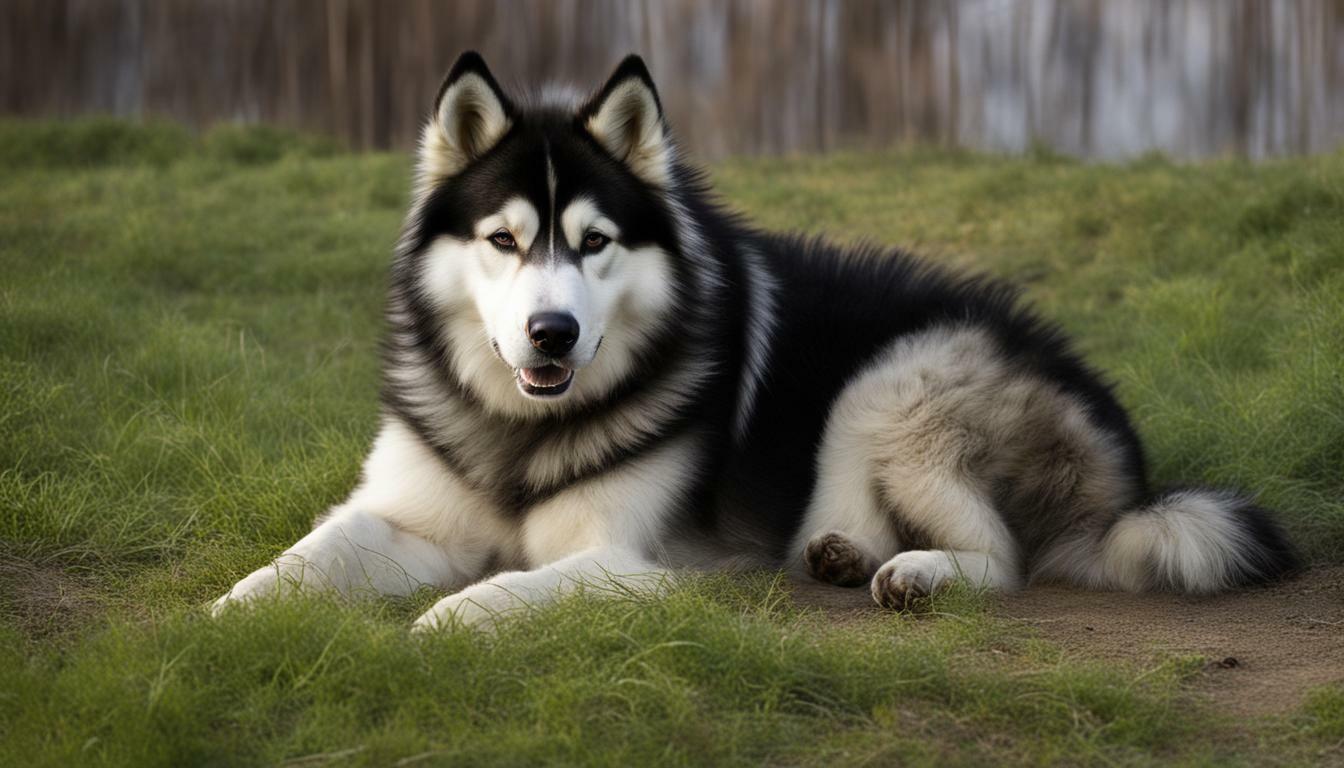If you’ve noticed an unpleasant odor coming from your Alaskan Malamute, it’s essential to understand why and find solutions to eliminate the smell. While Alaskan Malamutes are generally not known to have a bad odor, there are several possible reasons for this issue. Common causes include being in water, yeast infections, skin infections, impacted perianal glands, poor dental hygiene, or other health issues.
To address the wet-dog smell, it’s important to bathe your Malamute regularly using odor-neutralizing dog shampoo and ensure they are thoroughly dried. Yeast infections, skin infections, and impacted perianal glands may require treatment from a veterinarian. Maintaining good dental hygiene through dental treats or toothbrushing can help prevent odor. If the smell persists or you have concerns about your Malamute’s health, it’s best to consult a veterinarian.
Anal sac disease is another potential cause of a fishy smell and would need veterinary attention, including possible expression or surgical removal of the anal sacs. Preventive measures for anal sac disease and other issues can include a balanced diet, regular exercise, and monitoring weight and stool quality.
Understanding and addressing the underlying causes of a bad smell in your Alaskan Malamute is crucial for their well-being and your enjoyment of them. By following proper grooming techniques, seeking veterinary care when needed, and taking preventive measures, you can ensure your Malamute stays fresh and odor-free.
Possible Reasons for a Smelly Alaskan Malamute
There are various reasons why your Alaskan Malamute might have a noticeable odor, including factors like exposure to water, infections, or grooming issues. If your Malamute spends a lot of time in water, such as swimming or playing in wet environments, this can contribute to a wet-dog smell. Additionally, yeast infections and skin infections can also cause a bad odor. These infections can occur due to allergies, poor grooming habits, or underlying health conditions. It is important to address these infections promptly to alleviate the smell and prevent further complications.
If your Malamute has impacted perianal glands, this can also contribute to a foul odor. These glands, located near the anus, can become blocked or infected, leading to a strong smell. An examination by a veterinarian is necessary to determine the appropriate treatment, which may involve expressing the glands or administering antibiotics.
Poor dental hygiene can also be a culprit behind your Malamute’s bad smell. Tartar buildup and gum disease can result in unpleasant breath and overall oral odor. Regular dental care, such as brushing your dog’s teeth or providing dental treats, can help maintain good oral hygiene and reduce the odor.
While some odor is normal for dogs, persistent or excessively strong smells should not be ignored. If your Malamute’s odor does not improve with regular grooming and preventive measures, it is essential to seek veterinary care. A veterinarian can diagnose and treat any underlying health issues that may be causing the persistent odor. Remember, a healthy Malamute should not have a strong or unpleasant smell, so addressing the issue promptly will not only improve their quality of life but also ensure their overall well-being.
Grooming Tips to Tackle Malamute Odor
Grooming plays a vital role in managing and reducing odor in Alaskan Malamutes. Here are some tips to keep your Malamute smelling fresh:
| Grooming Tip | Description |
|---|---|
| Regular Bathing | Bathe your Malamute with a mild, odor-neutralizing dog shampoo every four to six weeks. Avoid over-bathing, as it can strip the natural oils from their skin and cause dryness. |
| Drying Thoroughly | After bathing or getting wet, ensure your Malamute is thoroughly dried, especially in their coat’s dense undercoat. Moisture trapped in the fur can create a musty smell. |
| Brushing | Regularly brush your Malamute’s coat to remove dirt, debris, and loose fur. This not only keeps their coat looking healthy but also helps distribute natural oils and reduce odor. |
| Ear Cleaning | Maintain your Malamute’s ear hygiene by gently cleaning their ears with a specially formulated dog ear cleaner and cotton pad. Excessive wax can contribute to a bad smell. |
| Oral Care | Brush your Malamute’s teeth regularly using a dog-specific toothbrush and toothpaste. Dental treats can also help minimize dental odor and maintain oral hygiene. |
By following these grooming tips and addressing the potential causes of your Malamute’s odor, you can create a more pleasant environment for both you and your furry companion.
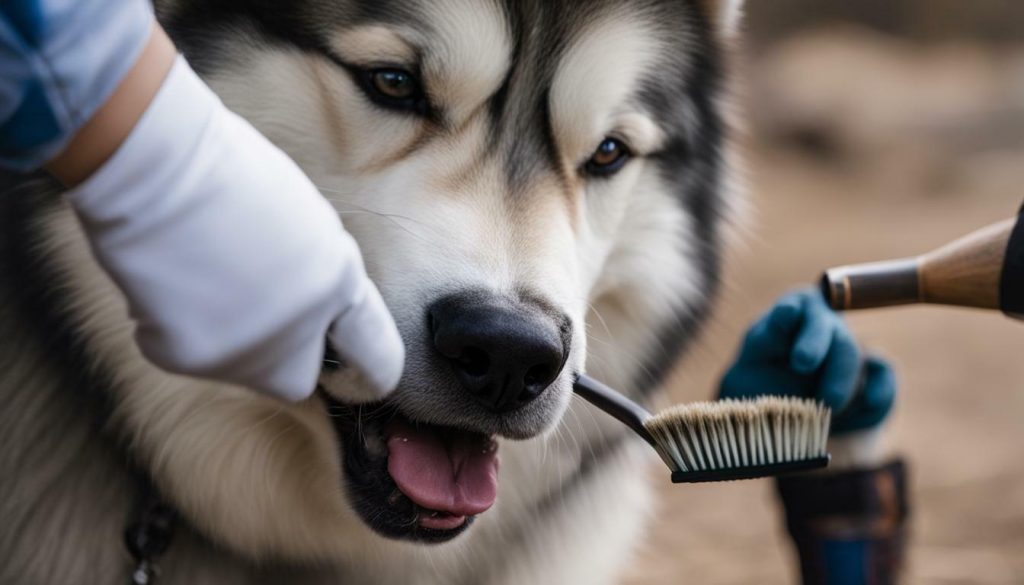
Regular bathing and proper grooming techniques can significantly help in controlling and reducing the odor of your Alaskan Malamute. Here are some tips to ensure your Malamute stays fresh and clean:
- Use a mild, odor-neutralizing dog shampoo specifically formulated for your Malamute’s skin and coat. Avoid using human shampoo, as it can be drying and harsh on their skin.
- Thoroughly wet your Malamute’s coat with warm water before applying the shampoo. Massage the shampoo into their fur, paying attention to the areas prone to odor, such as the neck, underarms, and hindquarters.
- Rinse your Malamute thoroughly, making sure to remove all traces of shampoo. Any residue left behind can cause skin irritation and contribute to a lingering smell.
- After bathing, gently towel-dry your Malamute to remove excess moisture. Using a hairdryer on a low or cool setting can also help speed up the drying process.
- Regularly brush your Malamute’s coat to remove loose hair and prevent matting, which can trap odors. Choose a brush suitable for your Malamute’s coat type and brush in the direction of hair growth.
- Trim your Malamute’s nails regularly to prevent dirt and debris buildup, which can contribute to odor. If you’re unsure how to safely trim their nails, ask your veterinarian or a professional groomer for guidance.
Remember, every Malamute is unique, and their grooming needs may vary. It’s essential to establish a regular grooming routine that suits your Malamute’s specific needs and preferences. By incorporating these bathing and grooming techniques into your routine, you can help keep your Alaskan Malamute smelling fresh and clean.
Table 1: Recommended Grooming Tools for Alaskan Malamutes
| Grooming Tool | Description |
|---|---|
| Slicker Brush | Ideal for removing loose hair and preventing matting. |
| Undercoat Rake | Designed to remove loose undercoat and reduce shedding. |
| Nail Clippers | Used to trim your Malamute’s nails to an appropriate length. |
| Ear Cleanser | Helps to remove dirt and prevent ear infections. |
| Toothbrush and Toothpaste | Essential for maintaining good dental hygiene in your Malamute. |
“Proper grooming not only improves your Malamute’s appearance but also plays a crucial role in controlling and reducing odor. It is essential to establish a consistent grooming routine to keep your furry companion comfortable and smelling fresh. Regular bathing, using the right shampoo, and employing the appropriate grooming tools are key steps in maintaining a pleasant scent.”
By following these dog grooming tips, you can ensure that your Alaskan Malamute stays clean, comfortable, and odor-free. Remember to pay attention to any changes in their odor or overall health, as persistent smell or accompanying symptoms may indicate an underlying health issue. Regular veterinarian check-ups are essential to address any concerns promptly and keep your Malamute in optimal condition.
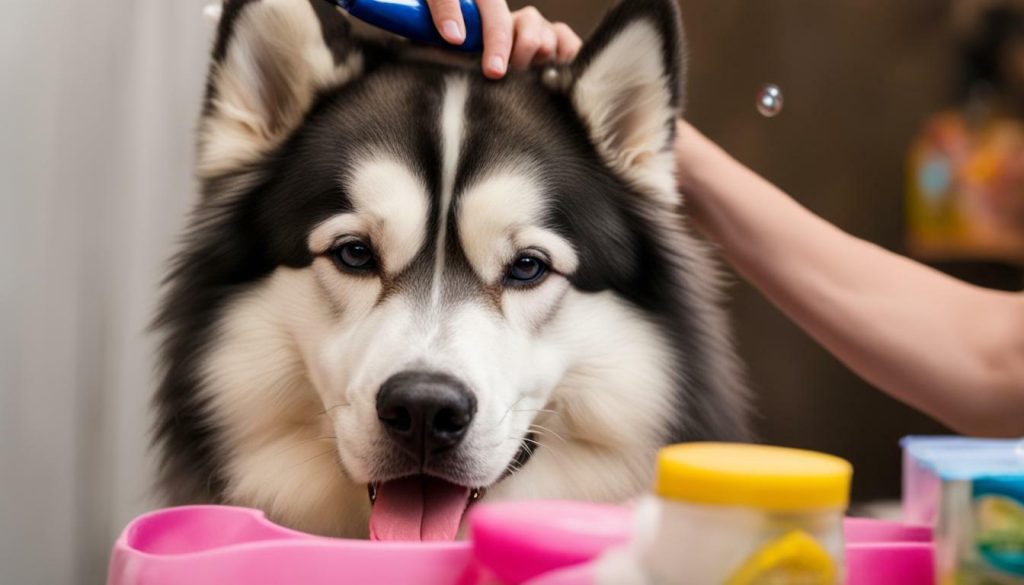
The wet-dog smell is a common issue among Alaskan Malamutes, but with the right grooming practices, you can effectively eliminate this odor. This distinctive smell often occurs when your Malamute gets wet and can linger if not properly addressed. Here are some tips to help you combat the wet-dog smell and keep your Malamute smelling fresh.
Firstly, regular bathing is essential. Use a high-quality, odor-neutralizing dog shampoo that is specifically designed to eliminate the wet-dog smell. Be sure to thoroughly lather your Malamute’s fur, paying special attention to areas that tend to hold onto moisture, such as the underbelly, armpits, and paws. Rinse your Malamute thoroughly to remove all the shampoo, as any residue can contribute to the lingering odor.
In addition to regular bathing, it’s important to make sure your Malamute is completely dry after getting wet. Use a clean towel or a pet-safe blow dryer on a low, cool setting to dry your Malamute’s fur. Moisture trapped in the fur can create a breeding ground for bacteria and contribute to the wet-dog smell. Take your time and ensure your Malamute is completely dry before allowing them to roam freely.
Table: Wet-Dog Smell Prevention
| Grooming Tips | Benefits |
|---|---|
| Regular bathing | Removes dirt and bacteria that cause odor |
| Using odor-neutralizing dog shampoo | Specifically targets and eliminates wet-dog smell |
| Thoroughly drying your Malamute | Prevents moisture buildup and bacterial growth |
Remember, prevention is better than cure when it comes to the wet-dog smell. By maintaining a regular grooming routine and following these tips, you can ensure your Alaskan Malamute stays fresh-smelling and comfortable, even after getting wet. With proper care and attention, you and your furry friend can enjoy many odor-free adventures together!
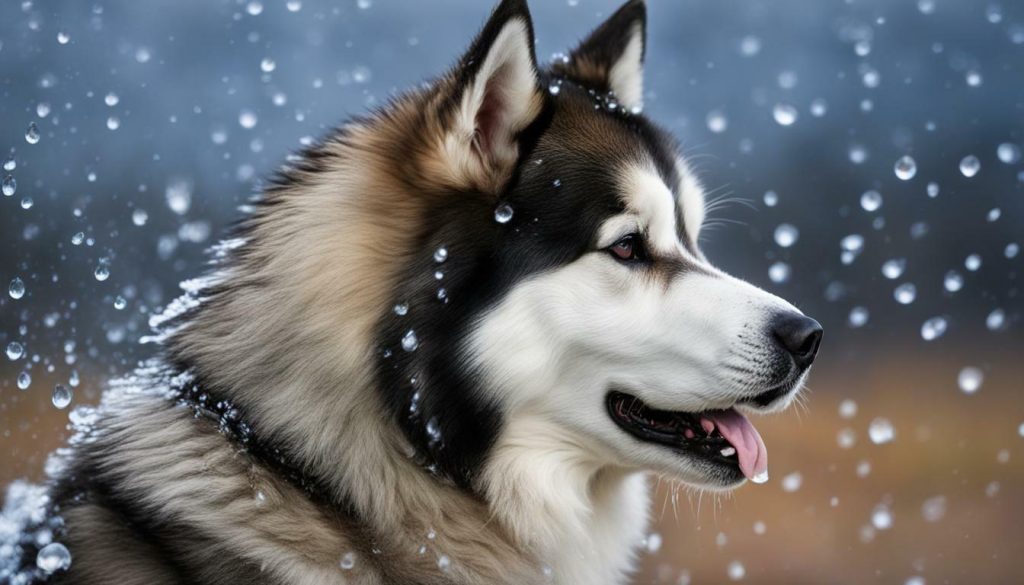
Sources:
– American Kennel Club. “How to Bathe and Dry a Dog.” www.akc.org
– Animal Humane Society. “Grooming: Bathing Your Dog.” www.animalhumanesociety.org
Managing Yeast Infections and Skin Infections
Yeast infections and skin infections are potential causes of the unpleasant odor in your Alaskan Malamute, but with proper care and treatment, you can address these issues. Yeast infections occur when there is an overgrowth of yeast on the skin, often due to factors such as excessive humidity or underlying allergies. Skin infections, on the other hand, can be caused by bacteria entering through cuts, scratches, or hot spots.
One way to manage yeast and skin infections is by keeping your Malamute’s skin clean and dry. Regularly bathe them with a gentle, hypoallergenic shampoo specifically formulated for dogs. Avoid using harsh chemicals or fragrances that can further irritate their skin. After bathing, make sure to thoroughly dry your Malamute, paying extra attention to the areas where moisture tends to accumulate, such as between the toes and under the armpits.
Additionally, it’s important to consult with a veterinarian for proper diagnosis and treatment. They may recommend antifungal or antibacterial medications, topical treatments, or other remedies based on the severity and underlying cause of the infection. They can also provide guidance on preventive measures to minimize the risk of future infections.
| Tips for Managing Yeast and Skin Infections: |
|---|
| 1. Keep your Malamute’s skin clean and dry. |
| 2. Use a gentle, hypoallergenic shampoo for bathing. |
| 3. Thoroughly dry your Malamute after bathing. |
| 4. Consult a veterinarian for proper diagnosis and treatment. |
| 5. Follow the veterinarian’s recommendations for medications and preventive measures. |
Yeast and skin infections can contribute to an unpleasant odor in Alaskan Malamutes. By providing proper care and treatment, you can help your furry friend feel more comfortable and eliminate the unpleasant smell.
Remember, prevention is key to maintaining your Malamute’s overall health and preventing future infections. Regularly check their skin and coat for any signs of redness, inflammation, or unusual discharge. Keep their living environment clean and free from allergens. And don’t forget to maintain a balanced diet to support their immune system and promote healthy skin.
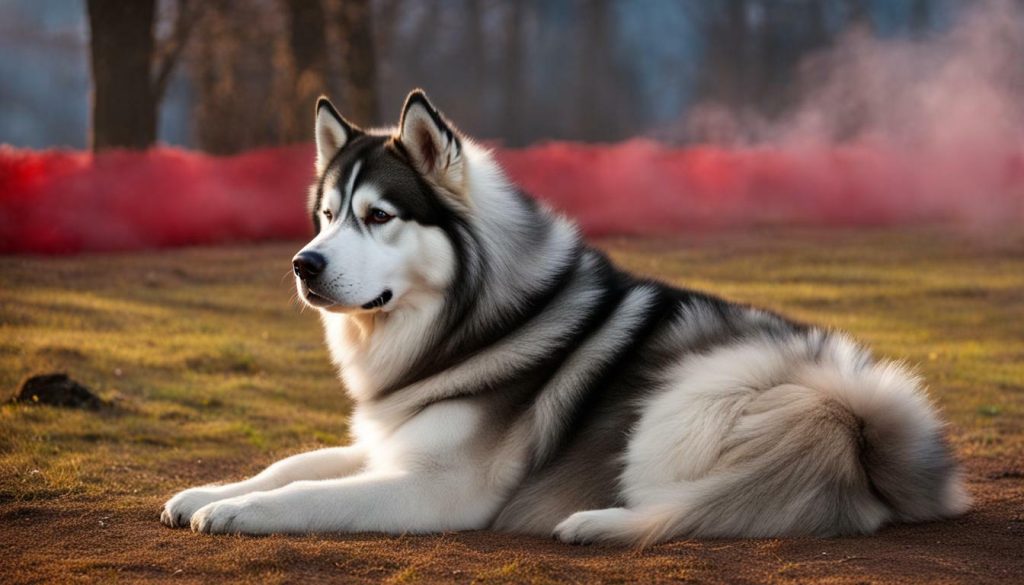
Yeast and skin infections are potential reasons your Alaskan Malamute may have an unpleasant odor. Proper care and treatment, including regular cleaning, drying, and veterinary guidance, can help address these issues. Follow the tips provided, such as using a gentle shampoo, thoroughly drying your Malamute after bathing, and consulting a veterinarian for diagnosis and treatment. By taking proactive measures, you can help your Malamute feel fresh and odor-free.
Dealing with Impacted Perianal Glands
Impacted perianal glands can be a cause of the foul odor in your Alaskan Malamute, but proper expression or treatment can help resolve this problem. These glands, also known as anal sacs, are located on either side of your dog’s anus and can become blocked or infected, leading to discomfort and a strong smell. If your Malamute is experiencing this issue, it’s important to address it promptly to alleviate their discomfort and eliminate the odor.
If you suspect that your Malamute’s perianal glands are impacted, it is best to seek veterinary assistance. A vet will be able to assess and express the glands safely and effectively. They may also recommend a course of treatment if there is an infection present. Your vet can guide you on how often the glands should be expressed and provide instructions on how to do it at home if necessary.
In addition to expressing the perianal glands, there are also preventive measures you can take to reduce the chances of them becoming impacted again. A balanced diet, regular exercise, and monitoring your dog’s weight and stool quality can help promote regular gland emptying. It’s also important to keep your Malamute’s anal area clean and groomed. Regular bathing can help keep the area clean and reduce the risk of infections.
| Grooming Tips for Dealing with Impacted Perianal Glands: |
|---|
| Regularly inspect your Malamute’s anal area for any signs of swelling, redness, or discharge. |
| Keep the area around the anus clean by regularly wiping it with a damp cloth or pet-safe wipes. |
| Trim the hair around the anus to prevent it from blocking the gland openings. |
| Provide your Malamute with a high-fiber diet to promote healthy bowel movements and gland emptying. |
| Ensure your dog has plenty of opportunities for exercise to maintain a healthy weight and promote regular bowel movements. |
By addressing impacted perianal glands and taking preventive measures, you can help keep your Alaskan Malamute free from unpleasant odors and discomfort. Remember to consult your veterinarian if you have any concerns or if the smell persists despite proper gland expression and grooming.
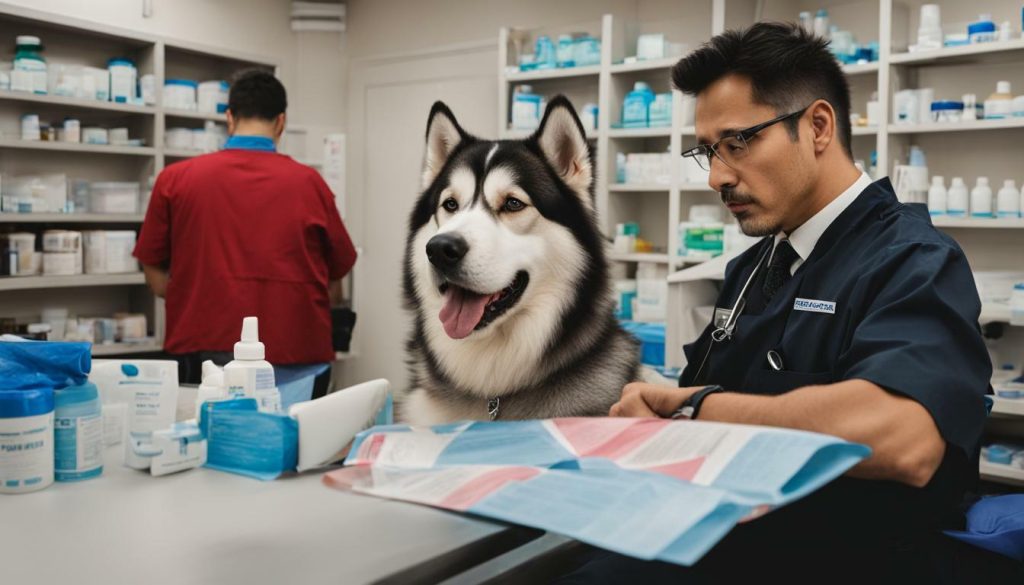
Poor dental hygiene can contribute to the unpleasant smell in your Alaskan Malamute, but by establishing a dental care routine, you can improve their breath and overall odor. Just like humans, dogs can suffer from dental issues such as plaque buildup, tartar accumulation, and gum disease. These oral problems can lead to bacteria growth, which can cause bad breath and contribute to a foul smell in your Malamute.
To maintain your dog’s dental hygiene, consider the following tips:
| Tips for Dental Care |
|---|
| 1. Brush their teeth regularly using a dog-specific toothbrush and toothpaste. Aim for daily brushing if possible. |
| 2. Provide dental treats or chews that help reduce plaque and tartar buildup. |
| 3. Offer dental toys or chew toys that promote healthy teeth and gums. |
| 4. Schedule regular dental check-ups with your veterinarian to monitor your Malamute’s oral health. |
By taking these steps, you can not only improve your Alaskan Malamute’s breath but also help prevent dental diseases and enhance their overall well-being. Remember, a healthy mouth leads to a happier, odor-free dog!
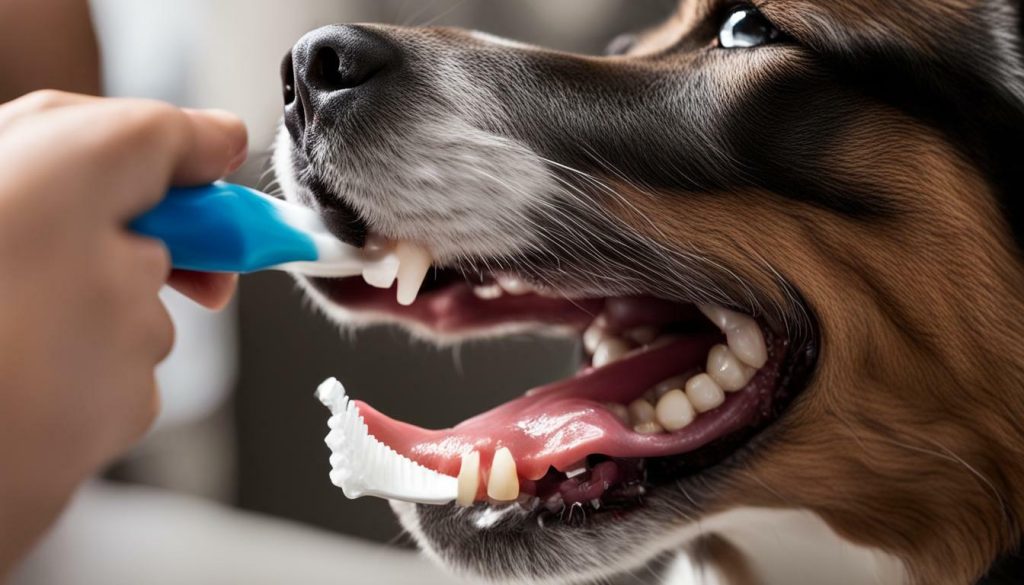
“A fresh-smelling breath goes a long way in keeping your Alaskan Malamute pleasant to be around. Regular dental care is an essential part of their overall grooming routine.” – Dr. Rachel, DVM
Seeking Veterinary Care for Persistent Odor or Health Concerns
If the bad smell from your Alaskan Malamute persists or if you have additional health concerns, it’s crucial to seek professional advice from a veterinarian. Persistent odor can be a sign of an underlying health issue that requires medical attention. A veterinarian will be able to conduct a thorough examination to determine the cause of the odor and recommend appropriate treatment options.
In some cases, the bad smell may be indicative of an infection or disease that needs to be treated promptly. Delaying veterinary care can potentially worsen the condition or lead to other complications. It’s important to remember that as a responsible pet owner, your main priority is the well-being of your Alaskan Malamute, so don’t hesitate to reach out to a veterinarian if you have any concerns.
When to Schedule a Veterinary Visit
There are several signs that indicate you should schedule a veterinary visit for your Alaskan Malamute’s persistent odor or health concerns. These signs may include:
| Signs to Look Out For | Description |
|---|---|
| Strong, unpleasant odor that persists despite regular grooming | This could indicate an underlying health issue that needs to be addressed. |
| Changes in appetite or weight loss | These could be signs of a digestive or metabolic problem affecting your dog’s overall health. |
| Excessive scratching or licking | This may indicate allergies, skin infections, or the presence of parasites. |
| Behavioral changes or lethargy | If your Malamute is displaying unusual behavior or seems uncharacteristically tired, it’s important to have them assessed by a professional. |
By keeping a close eye on your Alaskan Malamute’s behavior and overall well-being, you can better identify any potential issues and take the necessary steps to address them. Remember, early intervention and proper veterinary care are key to resolving any persistent odor or health concerns that your Alaskan Malamute may be experiencing.
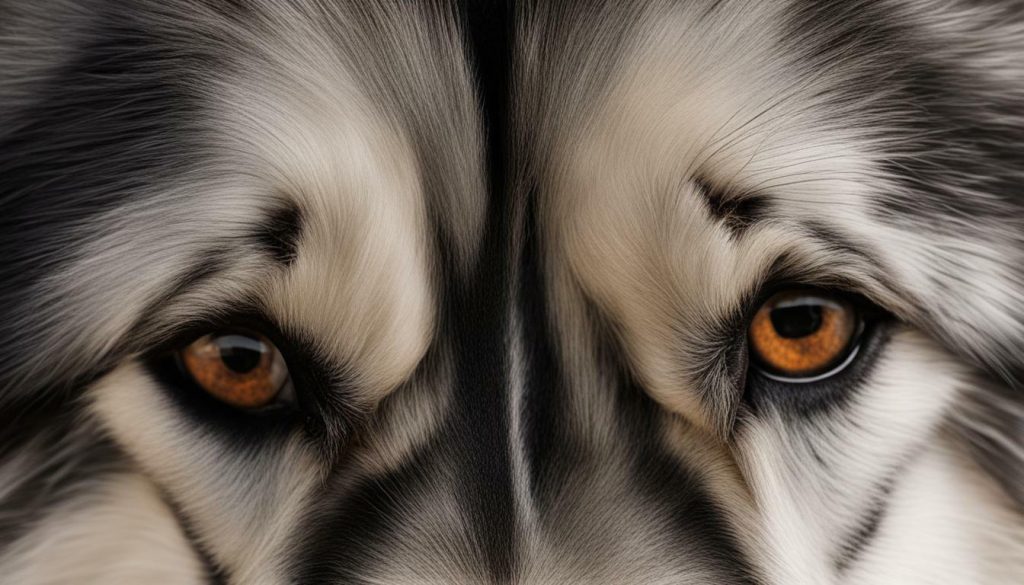
Anal sac disease can result in a fishy odor emanating from your Alaskan Malamute, but with proper treatment, including potential expression or surgical removal, this issue can be resolved. Anal sacs, also known as anal glands, are small sacs located on either side of your dog’s anus. These glands produce a strong-smelling fluid that is normally released during bowel movements. However, when the anal sacs become impacted or infected, they can cause discomfort and emit a foul odor.
To address anal sac disease in your Alaskan Malamute, it is important to consult a veterinarian. They will be able to diagnose the condition and recommend the appropriate treatment option. In some cases, the vet may manually express the impacted anal sacs, relieving the odor and discomfort. In more severe cases, surgical removal of the anal sacs may be necessary to prevent recurrent issues.
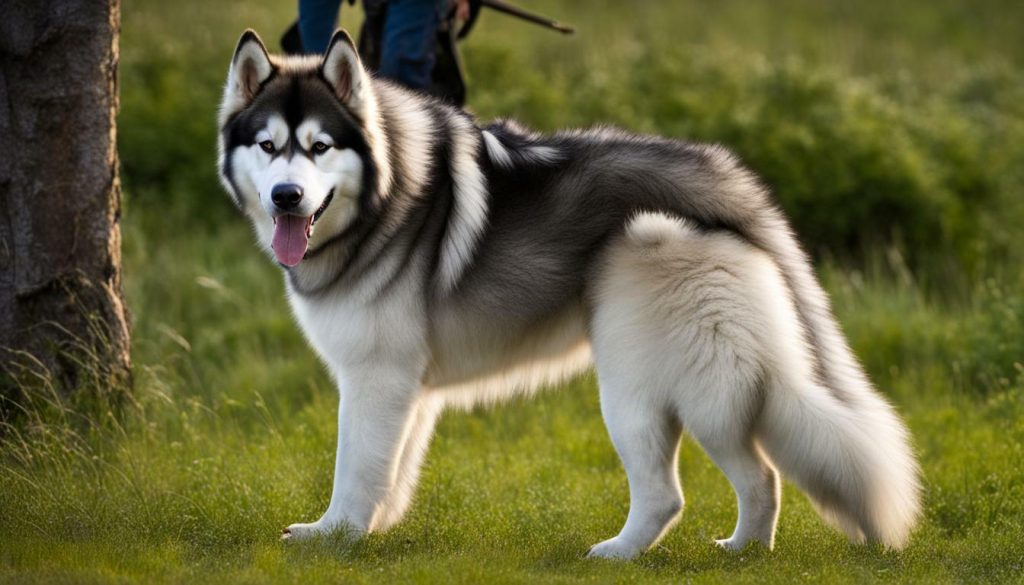
Preventing anal sac disease in the future is possible through a few simple measures. Firstly, maintaining a balanced diet and ensuring your Malamute gets enough fiber can help regulate their bowel movements and promote regular emptying of the anal sacs. Regular exercise is also important, as it aids in overall gastrointestinal health and prevents constipation. Additionally, monitoring your dog’s weight and stool quality can help you spot any potential issues early on.
| Treatment Options for Anal Sac Disease | Pros | Cons |
|---|---|---|
| Manual expression by a veterinarian | – Relieves discomfort and odor – Can be done during a routine vet visit |
– May require multiple expressions – Not a permanent solution |
| Surgical removal of the anal sacs | – Provides a long-term solution – Prevents recurrent issues |
– Requires anesthesia – Involves surgery and recovery time |
By addressing anal sac disease promptly and implementing preventive measures, you can help ensure that your Alaskan Malamute remains odor-free and comfortable.
Preventive Measures for Anal Sac Disease and Other Issues
Taking preventive measures, such as a balanced diet, regular exercise, and monitoring your Malamute’s weight and stool quality, can help prevent anal sac disease and other issues contributing to a bad smell. A well-balanced diet rich in essential nutrients can promote a healthy immune system and overall well-being, reducing the risk of skin infections and other health problems. Regular exercise helps to maintain a healthy weight and keep the anal sacs functioning properly.
In addition to a balanced diet and exercise, it is important to monitor your Malamute’s weight and stool quality. Obesity can increase the risk of anal sac problems, so keeping your dog at a healthy weight is essential. Monitoring your dog’s stool quality can also give you valuable insights into their digestive health. If you notice any changes, such as diarrhea or constipation, it is important to consult your vet to address any underlying issues.
Preventive measures also include regular grooming, such as brushing your Malamute’s coat to remove loose hair and prevent matting. This can help reduce the risk of skin infections and minimize odor. Additionally, maintaining good dental hygiene is crucial. Brushing your Malamute’s teeth regularly or providing dental treats can help prevent dental issues and bad breath, which can contribute to an unpleasant smell.
Tips for Preventive Measures:
“Regular exercise helps maintain a healthy weight and keeps the anal sacs functioning properly.”
“Monitor your Malamute’s weight and stool quality to ensure optimal health.”
“Brush your Malamute’s coat regularly to prevent matting and reduce the risk of skin infections.”
“Maintain good dental hygiene by regularly brushing your Malamute’s teeth or providing dental treats.”
Taking these preventive measures can significantly reduce the risk of anal sac disease and other issues that may contribute to a bad smell in your Alaskan Malamute. However, if the odor persists or if you have any concerns about your dog’s health, it is important to consult with a veterinarian for proper diagnosis and treatment.
| Preventive Measures | Benefits |
|---|---|
| Balanced diet | Promotes a healthy immune system and overall well-being |
| Regular exercise | Maintains a healthy weight and keeps anal sacs functioning properly |
| Monitoring weight and stool quality | Helps prevent obesity-related issues and provides insights into digestive health |
| Regular grooming | Reduces the risk of skin infections and minimizes odor |
| Dental hygiene | Prevents dental issues and bad breath |
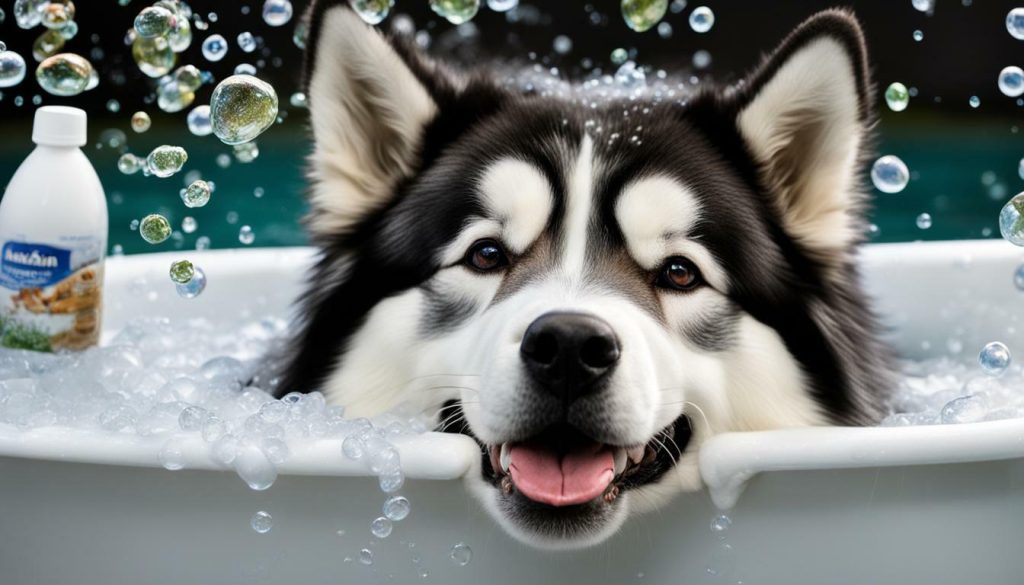
Understanding and addressing the reasons behind your Alaskan Malamute’s bad smell is essential for their well-being and your comfort, so take the necessary steps to eliminate the odor and keep your pet fresh and healthy.
Bathing your Malamute regularly with odor-neutralizing dog shampoo and drying them thoroughly can help with the wet-dog smell that they may develop after being in water. Additionally, maintaining good dental hygiene through dental treats or toothbrushing can contribute to controlling the odor. However, if the bad smell persists or if you notice other health concerns, it is best to consult a veterinarian.
Yeast infections and skin infections are common causes of a bad smell in Alaskan Malamutes. These require veterinary treatment, so make sure to reach out to your vet for proper diagnosis and management. Impacted perianal glands can also contribute to the odor, and a vet can express them to alleviate the smell. Anal sac disease, which can cause a fishy smell, may require expression or surgical removal of the anal sacs.
Prevention is key to avoiding recurring odor issues. Provide your Malamute with a balanced diet, regular exercise, and monitor their weight and stool quality. This can help prevent the development of anal sac disease and other potential causes of odor. By taking these steps, you can ensure that your Alaskan Malamute stays fresh, healthy, and odor-free.
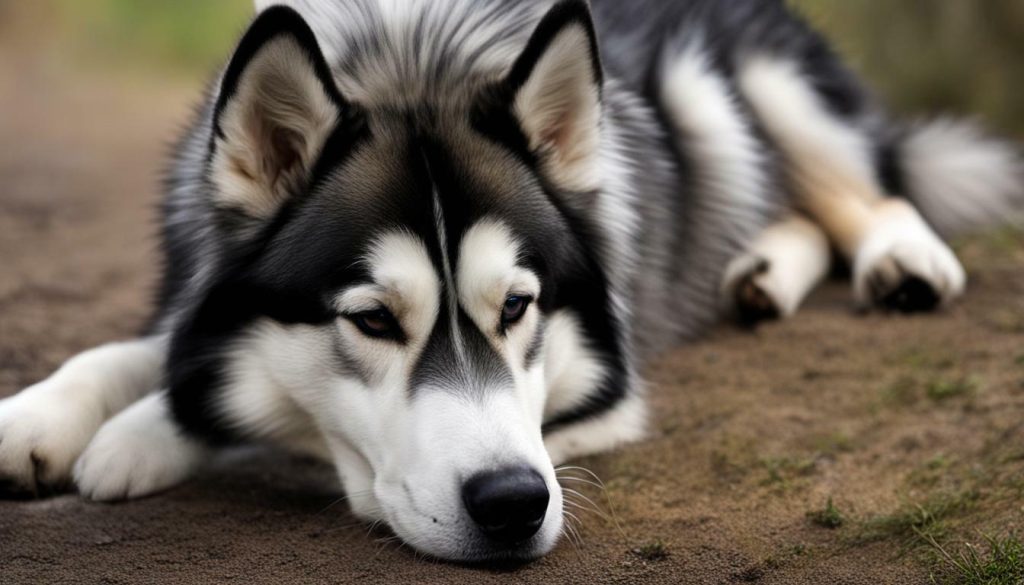
| Common Causes of Bad Odor in Alaskan Malamutes | Treatment |
|---|---|
| Being in water | Bathing with odor-neutralizing dog shampoo and thorough drying |
| Yeast infection | Veterinary treatment |
| Skin infection | Veterinary treatment |
| Impacted perianal glands | Veterinary expression |
| Poor dental hygiene | Dental treats or toothbrushing |
| Anal sac disease | Veterinary treatment, possibly expression or surgical removal of anal sacs |
Additional Resources for Alaskan Malamute Care
For further information and resources on caring for your Alaskan Malamute and managing their odor, refer to the following recommended sources:
- The Alaskan Malamute Club of America: This website provides comprehensive information on Alaskan Malamute care, including grooming tips and health guidance. They have a dedicated section on odor control and how to address common issues that may cause a bad smell in your Malamute.
- The American Kennel Club (AKC): The AKC is a trusted resource for dog owners. Their website offers a wealth of information on various dog breeds, including Alaskan Malamutes. You can find articles, guides, and videos on grooming, health, and maintaining a clean and odor-free environment for your pet.
- Vetstreet: Vetstreet is an online platform that provides veterinary advice and information on pet care. They have a dedicated section on Alaskan Malamutes, where you can find articles on grooming, health issues that may contribute to odor, and tips for managing your Malamute’s overall well-being.
- PetMD: PetMD is a comprehensive online resource for pet health and care. They offer articles, guides, and videos on various dog breeds, including Alaskan Malamutes. You can find valuable information on grooming techniques, addressing specific health issues that may cause odor, and maintaining a clean and odor-free living space for your Malamute.
By exploring these resources, you can gain a deeper understanding of how to care for your Alaskan Malamute, tackle any odor issues they may have, and ensure their overall well-being.
FAQ
Q: Why does my Alaskan Malamute smell bad?
A: Alaskan Malamutes are generally not known to smell bad, so if your Malamute does have a bad odor, there is likely an underlying reason. Some common reasons for a Malamute to smell bad include being in water, having a yeast infection, having a skin infection, having impacted perianal glands, having poor dental hygiene, or having another health issue.
Q: How can I get rid of the wet-dog smell in my Alaskan Malamute?
A: Bathing your Malamute regularly, using odor-neutralizing dog shampoo, and drying them thoroughly can help with the wet-dog smell.
Q: What should I do if my Alaskan Malamute has a yeast infection or skin infection?
A: Yeast infections and skin infections may require treatment from a veterinarian. It is best to consult with a veterinarian for proper diagnosis and treatment.
Q: How can I address impacted perianal glands in my Alaskan Malamute?
A: Impacted perianal glands can be expressed by a vet to relieve the smell. It is recommended to consult with a veterinarian for assistance.
Q: What can I do to maintain good dental hygiene for my Alaskan Malamute?
A: Poor dental hygiene can contribute to a bad smell. Managing dental hygiene can be done through dental treats or toothbrushing. Consult with a veterinarian for specific recommendations.
Q: When should I seek veterinary care for a persistent odor or health concerns?
A: If the smell persists or there are other health concerns, it is best to consult a veterinarian for proper diagnosis and treatment.
Q: Can anal sac disease cause a bad smell in Alaskan Malamutes?
A: Yes, anal sac disease may be a cause of a fishy smell in Alaskan Malamutes. Treatment from a vet, including possible expression or surgical removal of the anal sacs, may be necessary.
Q: How can I prevent anal sac disease and other issues that cause bad odor?
A: Preventing anal sac disease can be done through a balanced diet, regular exercise, and monitoring weight and stool quality. Regular veterinary check-ups are also important for overall health and prevention.
